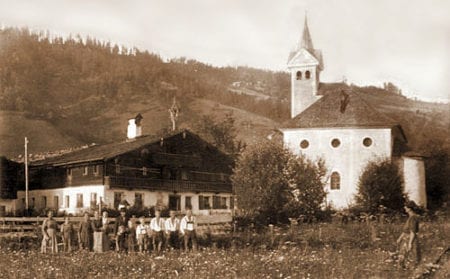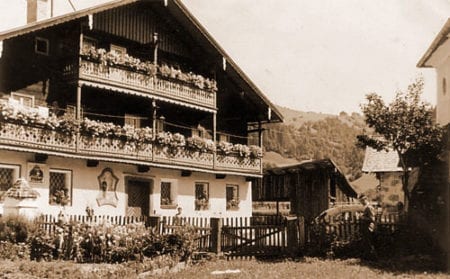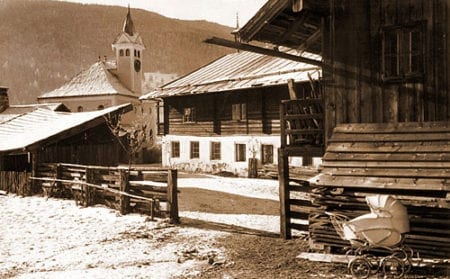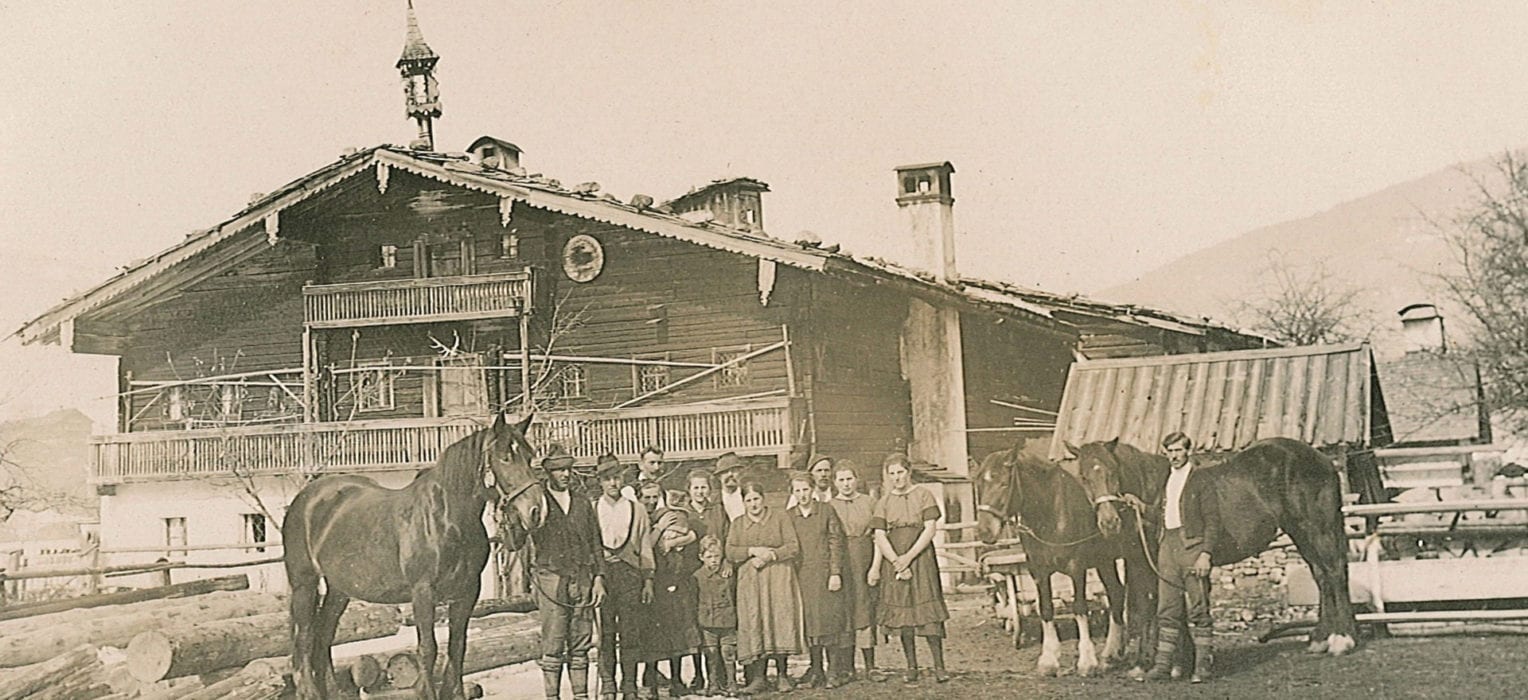Chronicle of our farm in Radstadt
Farm history of the Kasparbauer
Handed down from generation to generation. The Mayrhöfe Farms in the Taurach Valley are typical of Austrian ancestral farms. The farm and farming family are closely entwined. What scenes have played within these walls, in which one and the same family has lived. What tales it could tell. Tales of happy wedding days, sad periods of mourning, tales of love and sorrow, of war and hardship. In Tyrol such farms are called “farms of honour” and that’s what they are. There aren’t many left these days, the whirlwind of modern times uproots many a long-standing tree.



Handed down from generation to generation. This also applied to the Mayrhöfen farms, situated just a half an hour from Radstadt, along the valley on the right bank of the Taurach river, merged to one in local dialect under the name of “Kasperndörfl”. Originally one estate, later split into four separate farms, they are now once again combined to make one. The Kasparbauer at the Obermayrhof holds a tight reign over the Mittermay or Hödenhof, the Niedermayrhof or the Schobergut and the Diktenanwesen. A little king. The family name of the Kasparbauern farmer, Mayrhofer, bears witness to the many hundreds of years history of his family dynasty.
Let us tell you the story. Your head won’t spin with dates. Orginally the estate belonged to the Teising clan – a bourgeois family from Salzburg. After the family Teising died out it returned to the provincial ruler by which it was governed from 1415 to 1848, and to whom a yearly sum of 12 pound of pfennige had to be paid.
n the most ancient rent registers the name of a certain Rupert with his son Petrus appears. After him his daughter Elisabeth, who was married to Jakob. Then her son Leonhard Mayrhofer followed, who lived around 1500. Around 1600 a Ruprecht Mayrhofer appears, who passed on the farm to to his son Kaspar in 1610. The handover of the Tauernkaralm occured in 1618 through his authorised representative Georg Mayrhofer, citizen of and innkeeper in Radstadt, and the neighbour Ulrich Schober on theTaurach. Georg Mayrhofer was brother or cousin of Kaspar and owned the Sternwirtshaus inn in Radstadt, which until this very day is known by locals at the “Mayrhofwirt”.
Kaspar Mayrhofer, from whom the farm name “Kasparbauer” originates, was surely one of the most important and popular owners of the estate. His sister Anna married Thomas Piber from the Piberhof, another sister was wife of the innkeeper Michael Falnhauser “Guth Voglpüchl in Vorstau”. His above-mentioned brothers-in-law purchased the Alpine rights to the name Niederhütten, called “Alpl” for around 1700 Gilders and 24 Gilders worker fee, each for 15 Batzen or 60 Kreuzer of good Salzburg currency. Kaspar Mayrhofer died around 1645 leaving many children and grandchildren. What did a brave farmer go through in the uncertain times of the 30-year war? Even though its terrors had been warded off Salzburg territory by the drive and prudence of the Provincial Prince, the Archbishop Paris Lodron. Kaspar didn’t live to see the peace agreement which brought salvation. His son Michael had followed in his foosteps and taken over the family farm in 1637 for 1450 Gilders.
Noteworthy owners who followed are Sebastian Mayrhofer (1687) and Georg Mayrhofer (1707). As in other Salzburg bishoprics, tensions were brewing in the Taurach Valley too. Protestant preachers and Lutheran missionaries travelled through the mountain valleys persuading farmers and workers to turn their backs on the Catholic Church until finally Archbishop Leopold Firmian put an end to the religious revolts with his expulsion order of 31st October 1731. Over 22,000 inhabitants of the Province emigrated. Mayrhofer relatives were amongst them: Rupert Mayrhofer, Hausstätt farmer, 28 years old (his wife Regina Brandstätterin remained behind) and Wolf Mayrhofer, 72 years old, and his wife, Rosina Pergerin, 55 years old and their son Michael, 24 years old. On the Kaspargut farm the traditional faith as their forefathers was upheld.
The best known owner of the Kaspargut farm was undoubtedly Georg Mayrhofer, who ruled over the farm from 1770 to 1808 and brought enormous prosperity. Georg was the builder of the lovely, spacious chapel with its magnificent Mariahilf-Altar. Ancient writings prove that he renovated the farmhouse, constructed a threshing floor powered by water on the Taurach, cultivated a lovely tree garden which still exists today, and improved the alpine pasture in Vordergnaden with irrigation trenches, which can still be seen today.
In difficult times – the French were oppressing the country – his son Matthias took over the family farm and ran it from 1808 to 1859, a total of fifty years. In 1810 he married Katharina Stegerin, in 1852 Katharina Thurner, daughter from the Schaidl farm in Flachau. In 1859 ownership passed to his son Matthias, who married Elisabeth Kirchgasser and ran the farm until 1894. He died in 1896 at the age of 90 years.
In 1894 the Kasparbauer was handed down to Johann Mayrhofer, who married the Fels daughter Rosina Lackner and who left him with 4 children when she died. His second wife Anna, neé Huber, was faithful to him for 25 years, a gem of a woman. To the dismay of her family she was also buried in 1925, two of her twelve children died before her, her son Josef in the war.
Johann Mayrhofer, today’s owner, looks back with a sense pride coupled with a feeling of responsibilty on a long line of ancestors. Worthy of the best who ran the farm before him, he preserves the legacy of his forefathers, his homeland, farm traditions, religious beliefs and customs of the generations before him in these difficult times.
Even in 1883 the Schoberlehen, which had originally belonged to the Castle Schlosse Schermberg, passed into the ownership of the Mayrhofers. The groundholders here can also be traced back some 340 years. In 1604 the name Ulrich Schober appears, the founding father of many generations, which died out on the farm at the beginning of 1800. In 1851 the Kasparbauer farm son Rupert Mayrhofer acquired ownership, but sold on to his brother Matthias in 1865 in order to purchase the Forstergut in Hüttau. Some years later he emigrated with his wife Veronika Stiglitz, from the Ziller Valley, and their 5 children to America. Talk was of a shipwreck on the high seas, but nothing was heard from the emigrants. They probably perished at sea.
The Hödlehen, also called the Mittermayrhof farm, situated between the Schober and Kasparbauer farms, once served the St. Hieronymus and Elisabethaltar in the Salzburg Cathedral. The oldest known owner was Jakob Höd (1604), whose offspring lived here until 1829. After numerous changes of ownership the farm came to be owned by Johann Mayrhofer in 1895 and was incorporated into the Kasparbauern estate.
The fourth property, the Diktengut farm, has a long-standing tradition too. The name comes from Benedikt Mayrhofer, who lived here from 1694 to 1750. It served the St. Virgil’s Church Radstadt and had to pay 13 Pfennigs, later 1 Schilling 18 Pfennigs plus wine and 18 Pfennings writing fee.
“After Benedikt Mayrhoffer his son Jörg became owner, having bought out his brothers and sisters Michael, Margareth, Elspet, Magdalena and Anna.” This Georg Mayrhofer seems to have been a respected, capable man. In 1653 he received hunting ground in the Fager forest and Labenegg on both sides of the Radstädter Tauern as far as the Markstein from the church; the yearly fee was 1 marten, 6 squirrels, 1 hazel hen and 1 fox fur. A hunting dispute with Jakob Wiesenegger, Innkeeper on the Tauern, ended with a comprimise settlement. The Mayrhofer name stayed on the Diktengut until 1811, whereafter the Stainpachers took over for 100 years. The last owner bequeathed the farm to a niece, Anna Lürzer, Breitlehen daughter from Untertauern, who married Alois Bergmüller, Stocker son from Hüttau. After the early death of his wife, Bergmüller became ill and handed over the farm to rent to the Kasparbauer Johann Mayrhofer, so now as in olden days, the four Mayrhöfe farms are under one hand.
The Mayrhofer farming families have witnessed 500 years of Salzburg bishopric history and world events have rippled the peace of the Taurach Valley. Many thousands of walkers have passed the farms on the Tauern road, have looked up to and headed on their way. Times have changed, the people too; however, the spirit of old has remained at the Mayrhöfen farms.
Long live the farming families! May they last for many centuries to come, loyal to their inherited land.









